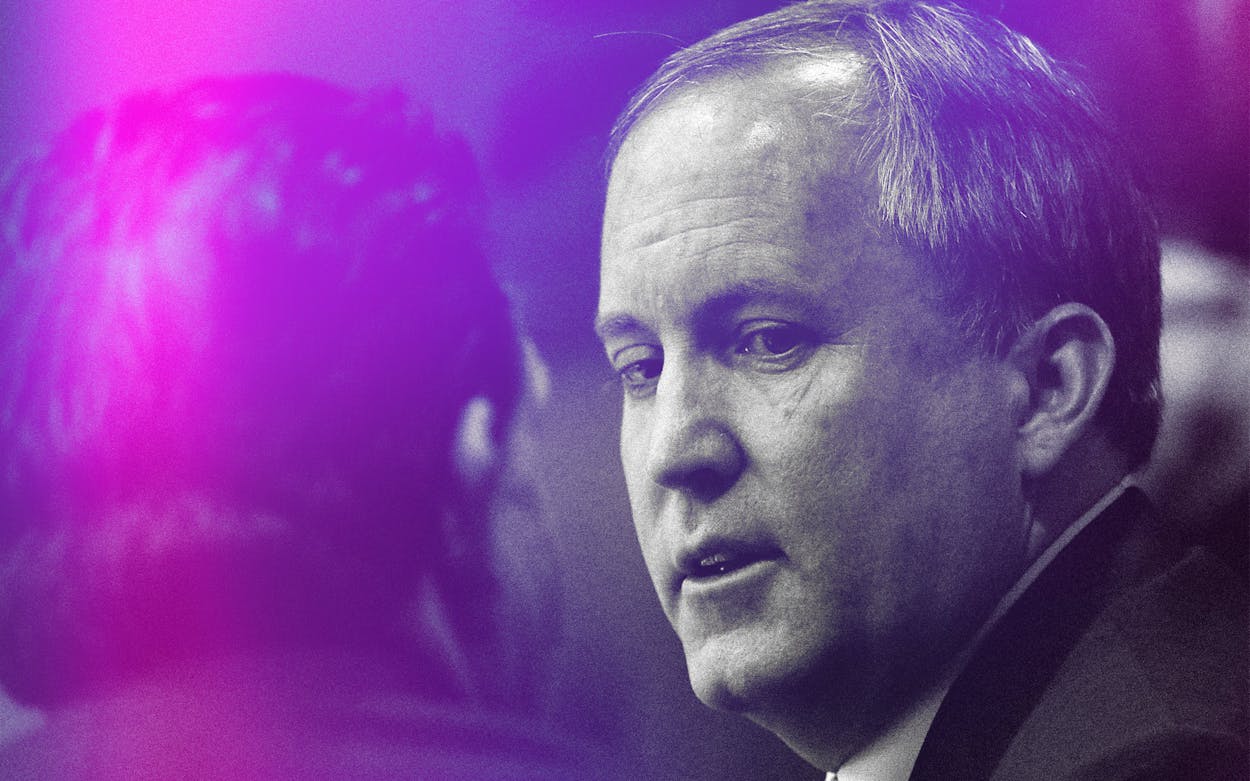Is Ken Paxton in trouble? It’s a question that anyone aware of the Texas attorney general has been asking for a full decade now. Thus far, the answer has always been, “Not yet; we’ll have to see what happens with the various crimes he’s been accused of.”
For a long while, resolution has seemed far away—particularly on the matter of the first crime Paxton stood formally charged with. A refresher: In 2014, the Texas State Securities Board disciplined Paxton, then an elected member of the state Senate, for violating the Texas Securities Act by soliciting clients for investment advisers without registering as a representative of those advisers. Then, in 2015, federal charges followed, and he was arrested and indicted with two counts of securities fraud. (He maintains his innocence.) Paxton was by then attorney general. As the top law enforcement officer in Texas, backed by some of the state’s wealthiest and most influential citizens, he acquired some formidable resources with which to delay his case, filing motion after motion that resulted in the trial being pushed back a full eight years.
Prosecutors sought in 2017 to move the trial out of Collin County, the North Texas home turf of the attorney general. Paxton had the right to challenge that change of venue, and he did. When he lost that challenge, he had the right to appeal it, and again he did. When he won that appeal, prosecutors had the right to appeal that decision, and they did. The first judge to rule that the trial venue should be moved to Harris County did so in early 2017, and subsequent courts essentially spent several years playing ping-pong, bouncing it back and forth twice in 2020, once more in 2021, and once again in 2023, with the final volley landing the case back in Harris County.
Additionally, Paxton allies, prosecutors, and others have fought a long dispute over the payment of special prosecutors who were hired to try Texas’s case against its attorney general. A Paxton campaign donor, Dallas-area real estate developer Jeff Blackard, first sued way back in 2015, arguing that those prosecutors were overpaid. The commissioners in Collin County refused to pay the lawyers. That spurred another lengthy legal battle—one that is ongoing, with the question of how much the special prosecutors will be paid as yet unresolved.
Now time is running out for the attorney general, necessitating that he dig deeper into his bag of tricks. With a trial date set for April 15, 2024, his legal team filed a motion on Tuesday to dismiss the case altogether, making a bold argument: Paxton’s constitutional right to a speedy trial has been violated, they argued, because of the many delays in his case. These delays, the lawyers write, were not because of Paxton’s motions but because the prosecutors resisted them. “Most of the delays were due to the State seeking to transfer the case from Collin County, opposing moving it back to Collin County, and more than any other cause, the pro tems seeking attorney’s fees,” the motion argues. “None of these events or causes were Paxton’s fault.”
So did the state drag its feet in bringing Paxton to trial, resulting in a violation of his rights, or did Paxton himself spend eight years challenging every action courts and prosecutors took, slowing down the process of his own accord?
That will be for (yet another) judge to determine. One thing we can all agree on, though, is that the trial certainly has taken a long time to get underway. Since Paxton was first indicted, we’ve experienced three different presidents and 21 Marvel movies. Muhammad Ali, David Bowie, Fidel Castro, and Antonin Scalia were all still alive when Paxton was booked. Taylor Swift had only just begun her crossover from country music to pop.
Will Paxton’s gambit succeed or fail? Will it push the trial even further down into the future? Will the judge be a robot by then? Given the case’s history, and the persistent wiliness of the attorney general and his wealthy supporters, we can only say: Who knows?
- More About:
- Ken Paxton








